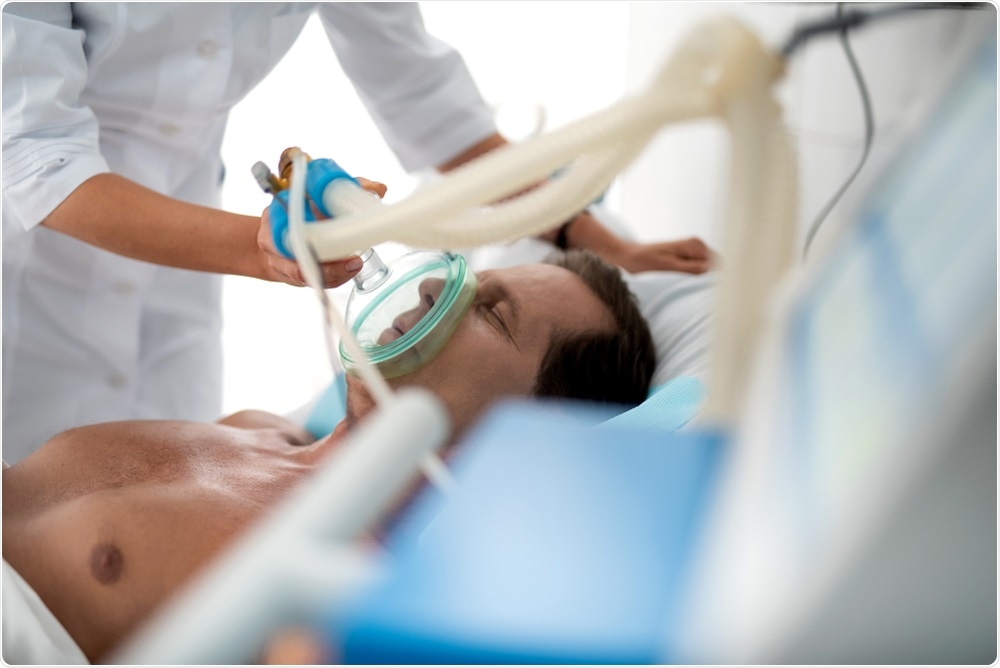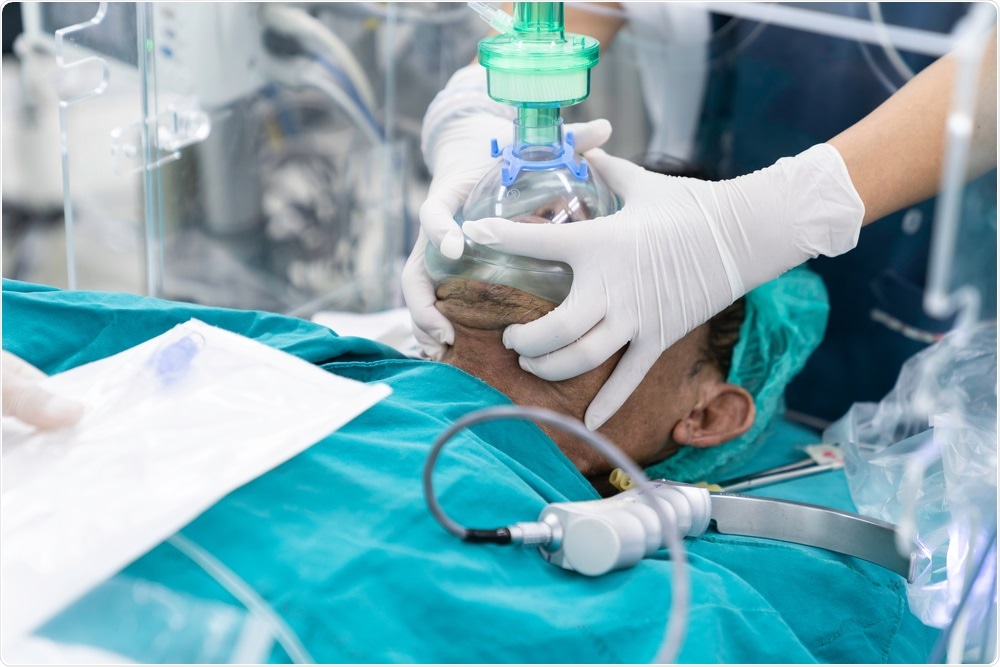As the severe acute respiratory syndrome coronavirus 2 (SARS-CoV-2), which is the pathogen responsible for the coronavirus disease (COVID-19), continues to spread across the globe, healthcare workers have remained committed to helping severely ill patients recover from this illness.
One of the most common complications of severe COVID-19 is respiratory failure, which arises due to severe interstitial bilateral pneumonia. Pronation maneuvers are often incorporated as part of the management of patients with respiratory failure.
 Study: Role of physiotherapy team in critically ill COVID-19 patients pronation: can a multidisciplinary management reduce the complications rate? Image Credit: Olena Yakobchuk / Shutterstock.com
Study: Role of physiotherapy team in critically ill COVID-19 patients pronation: can a multidisciplinary management reduce the complications rate? Image Credit: Olena Yakobchuk / Shutterstock.com

 This news article was a review of a preliminary scientific report that had not undergone peer-review at the time of publication. Since its initial publication, the scientific report has now been peer reviewed and accepted for publication in a Scientific Journal. Links to the preliminary and peer-reviewed reports are available in the Sources section at the bottom of this article. View Sources
This news article was a review of a preliminary scientific report that had not undergone peer-review at the time of publication. Since its initial publication, the scientific report has now been peer reviewed and accepted for publication in a Scientific Journal. Links to the preliminary and peer-reviewed reports are available in the Sources section at the bottom of this article. View Sources
A collaboration between researchers from the Clinica Luganese Moncucco and the University of Montpellier aimed to determine the efficacy of pronation maneuvers by the intensive care unit (ICU) physiotherapy team when used on critically ill COVID-19 patients.
The study, which appeared in the pre-print server medRxiv*, found that the incorporation of these maneuvers into the care of patients with severe COVID-19 reduced the rate of major complications in these patients. Meanwhile, a high rate of minor complications appeared to be associated with disease severity, rather than from pronation.
Pronation maneuvers
In the current study, pronation maneuvers were implemented to help patients who were experiencing severe complications of COVID-19. Respiratory failure is a common complication of severe COVID-19 that often requires mechanical ventilation through oro-tracheal intubation (OTI) or tracheostomy.
At the height of the pandemic, the intensive care units (ICUs) in many countries around the world were overwhelmed with the influx of patients with severe COVID-19. As a result, the burden of COVID-19 patient management for the ICU nursing staff significantly increased. In an effort to support these hospital workers, other healthcare team members, including physiotherapists, worked with ICU staff to help patients recover.
Pronation maneuvers are part of the treatment and management of COVID-19 patients in the ICU. Patients who require mechanical ventilation for acute respiratory distress syndrome (ARDS), which is a potentially fatal complication of COVID-19, benefit from pronation to improve ventilation and perfusion mismatch.
However, there are conflicting data about pronation-related complications in patients with ARDS. Whereas some studies have shown increased complications to occur after pronation, others did not find a heightened risk.
The study
In the current study, the researchers conducted a retrospective analysis to determine the rates and characteristics of pronation-related complications in critical COVID-19 patients. The team also aimed to evaluate the ongoing collaboration process between physiotherapists and nurses in critically ill COVID-19 patients by assessing the interaction with outcomes on the duration of mechanical ventilation and ICU length of stay.
Pronation is indicated for critically ill COVID-19 patients who are receiving invasive mechanical ventilation to treat ARDS. Pronation cycles were also indicated for patients with a P/F-ratio less than 150, despite standard-of-care management.
The ICU physiotherapy team consisted of a nurse and four physiotherapists. The team organized the daily activities in the ICU with the regular employment of physiotherapists for seven days a week. The average length of pronation was 16 hours a day and was performed according to international standards.
 Image Credit: ChaNaWiT / Shutterstock.com
Image Credit: ChaNaWiT / Shutterstock.com
The researchers also classified the complications during the study period into major and minor complications. The major complications included accidental endotracheal tube displacement, displacement of other devices, bone dislocations, and loss of peripheral vascular access. Meanwhile, minor complications include pressure ulcers.
The team treated 42 patients on mechanical ventilation wherein 296 standard prone/supination positioning were performed, with 3.52 cycles per patient. They noted one major complication, the accidental dislocation of the endotracheal tube, while 14 patients developed minor complications like pressure injuries. However, the incidence of pressure injuries was tied to the ICU length of stay and the duration in which the patients were on MV.
Conclusions
The team concluded that there is a low rate of major complications observed in critically ill COVID-19 patients. The high rate of minor complications, however, were linked to disease severity rather than from pronation.
"The persistent high incidence of minor complications appeared to be a consequence of disease severity, independently from pronation itself, supporting the hypothesis that pressure injuries are induced by complex pathogenetic mechanism, probably related to multiple mechanisms and not frankly influenced by pronation," the researchers explained.
"We hypothesize therefore that a trained specialized team is essential to reduce major complications during pronation," the team added, highlighting the importance of a complete healthcare team to perform pronation and supination cycles.

 This news article was a review of a preliminary scientific report that had not undergone peer-review at the time of publication. Since its initial publication, the scientific report has now been peer reviewed and accepted for publication in a Scientific Journal. Links to the preliminary and peer-reviewed reports are available in the Sources section at the bottom of this article. View Sources
This news article was a review of a preliminary scientific report that had not undergone peer-review at the time of publication. Since its initial publication, the scientific report has now been peer reviewed and accepted for publication in a Scientific Journal. Links to the preliminary and peer-reviewed reports are available in the Sources section at the bottom of this article. View Sources
Journal references:
- Preliminary scientific report.
Glotta, A., Faldarini, N., Biggiogero, M. et al. (2021). Role of physiotherapy team in critically ill COVID-19 patients pronation: can a multidisciplinary management reduce the complications rate? medRxiv. doi:10.1101/2021.06.20.21258949. https://www.medrxiv.org/content/10.1101/2021.06.20.21258949v1
- Peer reviewed and published scientific report.
Ceruti, Samuele, Andrea Glotta, Maira Biggiogero, Giovanni Bona, Andrea Saporito, Nicola Faldarini, Diana Olivieri, Claudia Molteni, Stefano Petazzi, and Xavier Capdevila. 2021. “Multidisciplinary Team Approach in Critically Ill COVID-19 Patients Reduced Pronation-Related Complications Rate: A Retrospective Cohort Study.” Annals of Medicine and Surgery 70 (October): 102836. https://doi.org/10.1016/j.amsu.2021.102836. https://www.sciencedirect.com/science/article/pii/S204908012100786X?via%3Dihub.